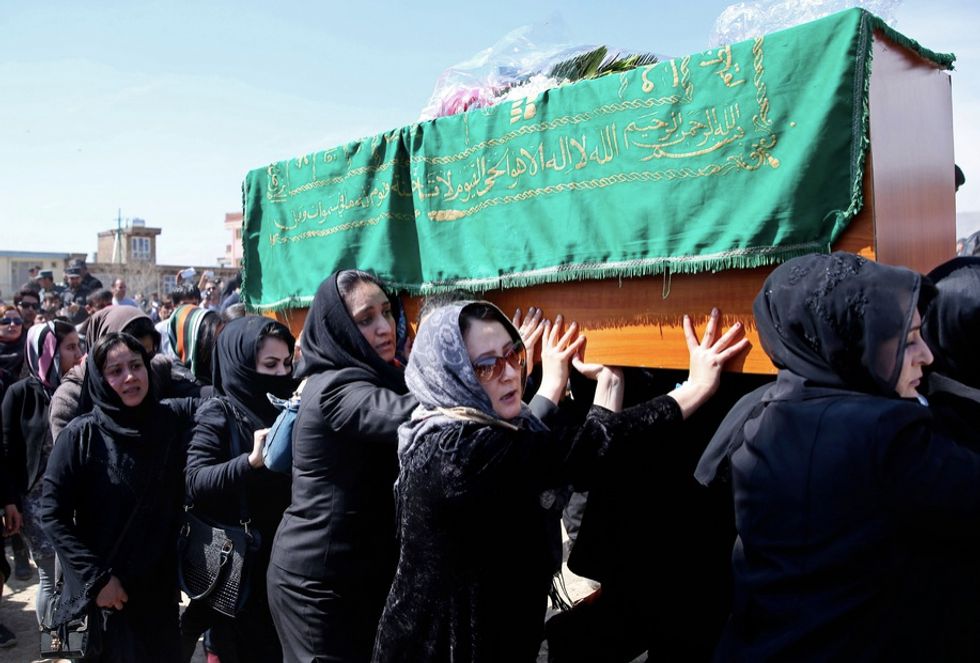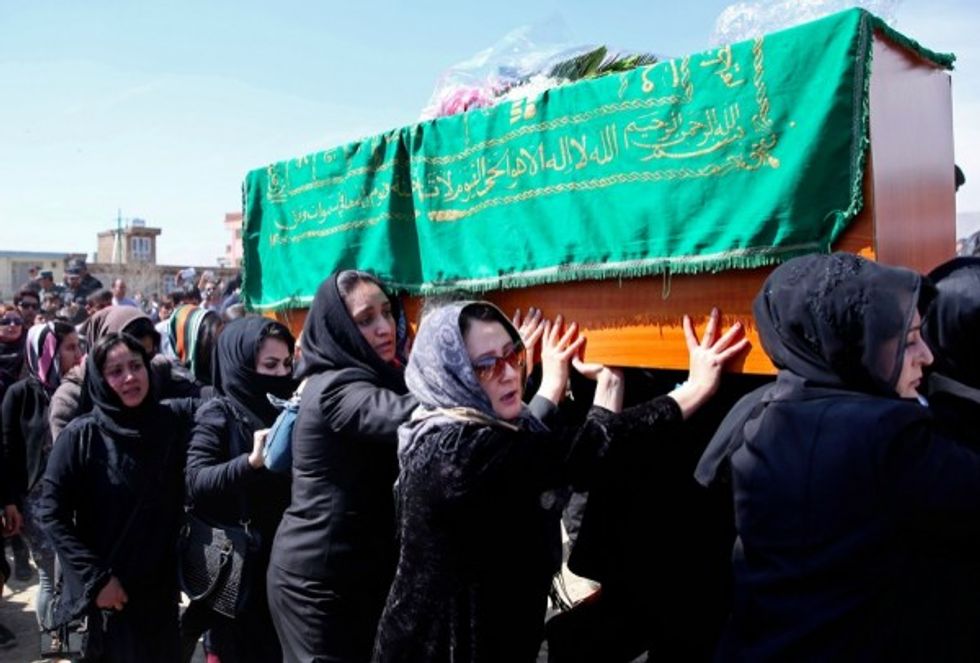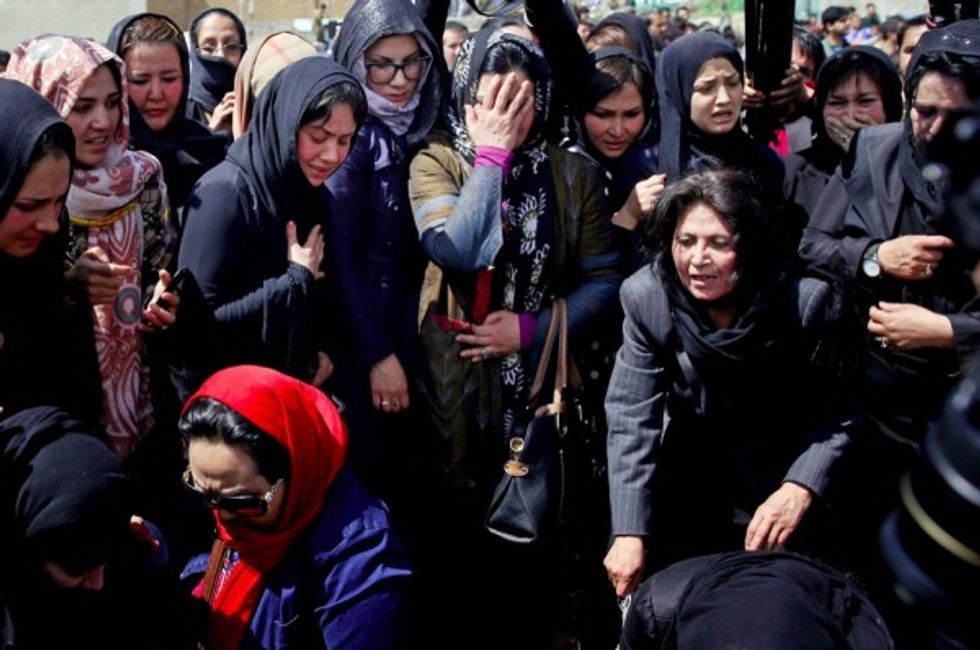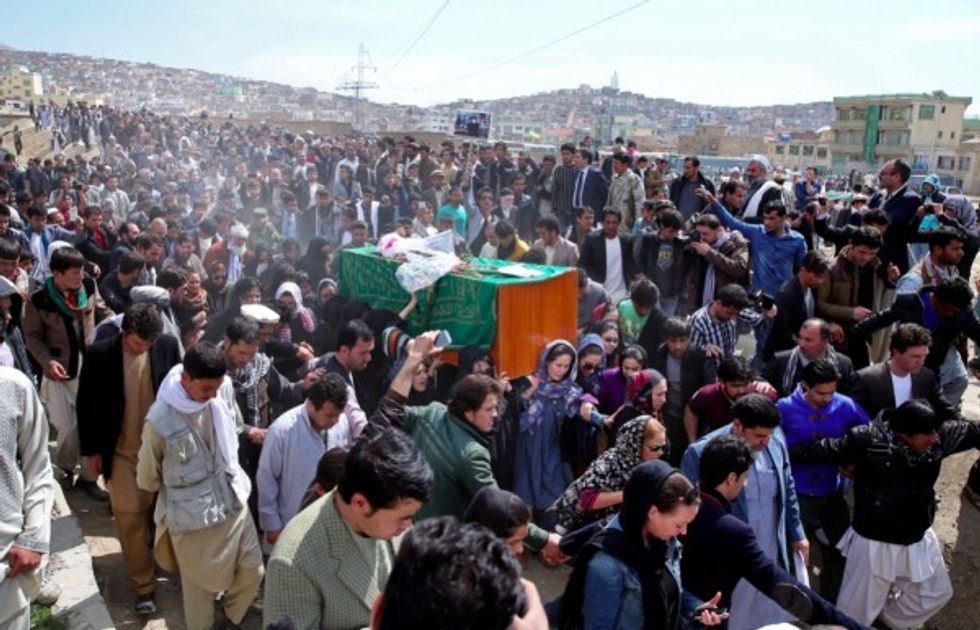
Afghan women rights activists carry the coffin of 27-year-old Farkhunda, an Afghan woman who was beaten to death by a mob, during her funeral, in Kabul, Afghanistan, Sunday, March 22, 2015. (Image source: AP/Massoud Hossaini)

KABUL, Afghanistan (TheBlaze/AP) — An Afghan woman who was beaten to death by a mob was buried in Kabul on Sunday, her coffin carried aloft by women's rights activists.
Hundreds of people gathered in northern Kabul for the funeral of 27-year-old Farkhunda, who like many Afghans is known by only one name.

She was killed late Thursday by a mob of mostly men who beat her, set her body on fire and then threw it into the Kabul River, according to police accounts. Police are still investigating what prompted the mob assault.
Some Afghan officials and religious leaders sought to justify Farkhunda's killing, alleging that she had burned a Koran.
But at her graveside, the head of the Interior Ministry's criminal investigation directorate, Gen. Mohammad Zahir, said no evidence had been found to support those allegations.
"We have reviewed all the evidence and have been unable to find any single iota of evidence to support claims that she had burned a Koran," Zahir said. "She is completely innocent."
He said that 13 people had been arrested in connection with her killing.
President Ashraf Ghani condemned Farkhunda's killing as a "heinous attack" and ordered an investigation.

Following allegations that police stood by and did nothing to stop the fatal attack, Ghani said it revealed "a fundamental issue" — the country's police were too focused on the fight against the Taliban insurgency to concentrate on community policing.
His comments followed widespread condemnation of the killing. In Afghanistan, women are generally treated as inferior, despite constitutional guarantees of equality. Violence against women often goes unpunished.
Hundreds of people gathered at a graveyard in the middle-class suburb of Khair Khana, near Farkhunda's home.
Unusually for Afghanistan, women's rights activists wearing black and with the permission of Farkhunda's father, carried her coffin from an ambulance into a mosque for prayers, and then from the mosque to her grave.

The city's head of criminal investigation, Mohammad Farid Afzali, has said Farkhunda suffered an unspecified psychiatric illness, but a neighbor told The Associated Press that she was nearing the end of a religious studies course and preparing to become a teacher.
"Everyone respected her, she was very religious and never left her home without covering her face with a hijab," said Mirwais Afizi, 40, who said he had lived on the same lane as Farkhunda's family all his life.
"We never heard anything about her being mentally ill. She was about to graduate," he said.
An Interior Ministry spokesman said earlier that Farkhunda's family was staying in protective care.
Ghani put women's rights and equality at the heart of his presidential campaign last year and has given his wife, Rula, a high public profile. A Christian of Lebanese descent, she has spoken for women's rights in Afghanistan — a country routinely named by international rights groups as one of the world's worst places to be a woman.
Under the harsh Islamic rule of the Taliban, who were ousted by a U.S.-led invasion in 2001, women were not permitted to work, study or leave their homes without a male relative. The new Afghan constitution guarantees women equal rights and protection from violence but these standards are still enforced haphazardly.
The New York-based Human Rights Watch issued a statement on what it called "the brutal murder of a vulnerable woman by a mob on Kabul's streets" and called for the punishment of police officers who took no action to stop the killing.
"The authorities need to prosecute those involved in this terrible crime and take action against any police officers who let the mob have its way," said Patricia Gossman, HRW's senior Afghanistan researcher.
—
Follow Dave Urbanski (@DaveVUrbanski) on Twitter